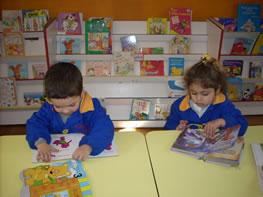Journal of Instructional Psychology , June, 2000
by Yuxiang Wang
 Children's attitudes toward reading are getting little attention in developing children's literacy ability. This article analyzes the factors that influence children's positive attitudes toward reading: children's personal experiences in reading, children's confidence in reading, parents' attitudes toward reading, and teachers' ways of teaching reading. Suggestions are provided about how to cultivate children's positive attitudes toward reading. Children's attitudes toward reading are getting little attention in developing children's literacy ability. This article analyzes the factors that influence children's positive attitudes toward reading: children's personal experiences in reading, children's confidence in reading, parents' attitudes toward reading, and teachers' ways of teaching reading. Suggestions are provided about how to cultivate children's positive attitudes toward reading.
Children's literacy development has attracted the attention of teachers, researchers, parents, and society, not only because of what has been termed the "literacy crisis", but also because children's literacy development determines children's future success in reading and writing. Researchers and teachers have explored the problem from various aspects, such as teaching methods (Eldredge, 1991; Mckenna, Stratton, Grindler, & Jenkins, 1995; Morrow, 1992), classroom environments (Grambell, 1996; Reutzel & Wolfersbersger, 1996), family involvement (Danielson, 1997; Thornburg, 1993), and community and societal environment (Noll, 1998). Different results have been found and suggestions given to help to develop children's literacy in and out of school.
Morrow (1992) found that children in literature-based classes not only read better, but also read more books and magazines than those in nonliterature-based classes. However, McQuillan (1998) insisted that teaching reading methods were less important than children's access to books. He claimed, "It is conceivable that the variations in the supply of reading materials may overwhelm differences in teaching methods, given that teachers and children are limited by the resources available to them" (p.68). At the end of his book, McQuillan (1998) concluded, "There is now considerable evidence that the amount and quality of students' access to reading materials is substantively related to the amount of reading they engage in, which in turn is the most important determinant of reading achievement" (p.86). Many researchers and teachers hold a similar view that schools, teachers, parents, and the society should provide chances for children to access a large amount of books (Brenna, 1995; Elley, 1996; Goodman and Goodman, 1979). However, reading is a process of getting meaning from the texts. If children do not want to get any meaning from the texts, it is not reading (Dombey, 1999). Whether children read or not is determined by their attitudes toward reading. If children do not like reading or they think that reading is boring, their negative attitude toward reading will hinder their reading improvement. Some researchers have used cash rewards to improve children's reading attitudes (Johnson, 1995; Meyer, 1995). However, McNinch (1997) found in his experiment with cash rewards that no significant changes were found in children's attitudes toward academic reading. Cash rewards, therefore, are not effective in changing children's attitudes toward reading over the long term.
There are various factors that influence children's attitudes toward reading: children's personal experiences in reading, children's confidence in reading, parents' attitudes towards reading, and teachers' ways of teaching. In this article, I intend to analyze factors that influence children's attitudes toward reading, and provide suggestions on how to cultivate a positive attitude toward reading.
Analysis of the Factors that Influence Children's Positive Attitude toward Reading
First, children's personal experiences in reading are directly related to children's attitudes toward reading. Can children get access to books? Are the books that children read interesting? Interesting books are that are predictable, have vivid pictures, and are related to children's lives. Do teachers and parents believe that children can read? Do children often fail in reading tests? If children get discouraging answers to these questions, it is impossible that they will like reading in or out of school because reading seems alien to them. They cannot get anything from reading. Gradually, they may form a negative attitude toward reading. As Feitelson & Goldstein (1986) have shown, 61 percent of low-income families have no books at all in their home. On the other hand, the standardized reading tests may make children suffer stress, illness, and long-term test anxiety (Smith, et al, 1991), which greatly frustrate children's interest in reading. Murphy (et al) (1998) point out the phenomenon: "`Failure' on one or more of these assessments might be interpreted as being caused by `low ability', `low intelligence', `dyslexia', or some other construct" (p. 90). When teachers come to believe that children do not have the ability to read because of one or more failures on tests, children may doubt their ability in reading, and may never succeed in reading
Moreover, children's confidence determines whether they can succeed or not, and their confidence in reading is built up as they read. Positive feedback about children's reading from teachers, peers, and parents makes children confident in reading. In various reading activities, children tell their classmates who they are, what they know, and what they care about (Oldfather & Dahl, 1994). Children can find their identities in the classroom, and may find that reading is related to their lives. From the praise of teachers and peers, children can build their confidence in reading. On the other hand, children who lack confidence often suspect their reading ability (Cole, 1999). The inappropriate interpretation of standardized tests hurts children's confidence |